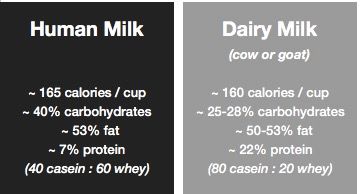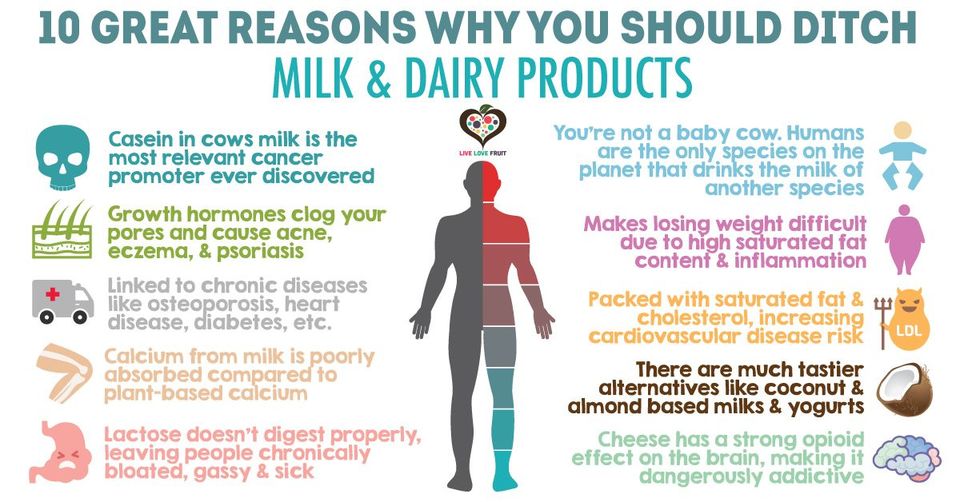Question
Do you recommend to completely discontinue the consumption of cow’s milk? Why?
Puneet
Answer
For optimal present and future health, neither cow’s milk nor the milk of any other animal should be consumed by any children or adults. The reasons why are many and entire books have been written on and dedicated to this subject.
However, we don’t even need any books or studies to educate us about this topic. All we need to do is to think logically, without the influence of any marketing, traditions, cultural customs, or misleading studies about the very act of consuming cow milk and how unnatural it is.
Here is a quick infographic from LiveLoveFruit.com that summarizes the biggest health problems associated with dairy, and below I explain more about why milk and dairy is unnatural and unhealthy for us.
Completely Unnatural
- No animal drinks milk past its weaning stage (baby stage), as milk is a mammary secretion created by lactating female animals strictly for the purpose of feeding the offspring in the first few weeks/months/years of life.
- Humans have deviated from nature completely by not only drinking milk past the weaning stage but worse yet, drinking the milk of another animal that is very different from itself.
- Humans have been conditioned by the herding society and dairy industry to drink cow’s milk and think of it as normal for the sake of profit, despite it being completely abnormal.
- No cow produces milk for human use, but for its own baby only. Humans forcefully have to impregnate cows and remove their babies from them in order to have the milk, which is completely abusive exploitation of the animal. Dairy is one of the cruelest industries with regards to how it treats animals.
From an evolutionary point of view, milk is a strange food for humans. It’s nature’s perfect food — but only if you’re a calf. Until 10,000 years ago we didn’t domesticate animals and weren’t able to drink milk. The majority of humans naturally stop producing significant amounts of lactase — the enzyme needed to deal with lactose, the sugar in milk — sometime between the ages of two and five.
Dr. Mark Hyman, MD — Dairy: 6 Reasons You Should Avoid It at All Costs
Wrong Nutrient Composition
- Humans have completely different growth and health needs than cows. A human baby weighs about 8 pounds at birth, and within 12 to 18 months (weaning stage) only weighs about 20 to 25 pounds. A baby cow weighs about 80 pounds at birth, and within 6 months (average weaning stage) weighs over 500 pounds! Such a large growth rate requires a completely different milk composition than that of human babies.
- Humans and cows, just like all other animals, have their own unique and specific nutritional needs. Humans are very different animals from cows, and hence, the milk of cows is not a good option for humans due to how incorrect the nutrient, hormone, and other biological composition of cow’s milk is for humans. This includes both, the amount and the type of casein — a protein that cow’s milk contains, and which is associated with many of the serious health problems cow’s milk causes.

Human breast milk is one of the lowest-protein milks in the mammalian world. This is one of the reasons why feeding straight cow’s milk to babies can be so dangerous. And, although the protein content in human milk has been described as extremely low, it’s exactly where it needs to be—at the natural, normal level for the human species, fine-tuned over millions of years.
Michael Greger M.D. FACLM — Changing Protein Requirements
Disease Risks
- Cow’s milk, including all dairy, is one of the top allergens of all foods, causing everything from obvious allergies to silent allergies that are expressed as immune system dysfunction, digestive dysfunction, etc.
- Dairy is inflammatory for the human body. Inflammation is associated with an increased risk for most chronic diseases.
- Cow hormones, as well as drug hormones that cows are given to produce milk interfere with human hormones, causing all kinds of hormonal imbalances, and increasing the risk of hormone-related cancers in both women and men, early onset puberty in children, fertility problems, and menstrual and menopause problems in women.
- Dairy is associated with an increased risk of cancer, including breast cancer and ovarian cancer in women, and prostate cancer in men. It is also linked to other cancers, as it has been proven to turn on cancer genes. This is particularly related to the casein protein in cow’s milk mentioned above. In addition, cancer risk is increased when consuming dairy due to the Bovine Leukemia Virus.
- Dairy is high in saturated fat and cholesterol, and increases the risk of high cholesterol, high blood pressure, and heart disease.
- Dairy is highly mucus-forming, and increases the risk of ear, nose, throat, and chest infections.
- Dairy is hard to digest, and is one of the top risk factors for constipation. It takes a toll on the digestive system in others ways too, is associated with IBS, Crohn’s and Ulcerative Colitis, as it does not lead to the creation of a healthy gut biome.
- Dairy does not create strong bones and dairy does not protect against osteoporosis). On the contrary, dairy has been associated with worse bone health.
- Dairy is associated with increased risk of diabetes, both Type 1 Diabetes and Type 2 Diabetes.
- Dairy is associated with an increased risk of skin disorders, including acne and other skin disorders, like eczema.
- Dairy is associated with an increased risk of Multiple Sclerosis and more complications for those who have MS and who consume dairy.
- Dairy is associated with weight problems, and not weight loss as misleading studies would have people believe.
Farming & Processing Risks
- Dairy, especially when pasteurized, is a highly problematic substance, as pasteurization denatures nutrients and thus interferes with the nutritional integrity of a substance. Pasteurization destroys heat-sensitive vitamins like vitamin C and the B vitamins, and not only reduces the calcium mineral, but also makes it less bioavailable.
- Modern dairy is full of drugs, pesticides, GMOs and other toxins due to how cows are fed and raised, which then further pollutes and increases the risk of diseases in our body.
- Modern dairy products are some of the worst processed foodsthat are not only high in fat, but also high in various sugars and artificial sweeteners, modified ingredients and GMOs, colors, flavors, and other additives.
- All dairy products are associated with these risks, but cheese is the worst dairy food of them all, due to its concentration of all of milk’s negative attributes.
Summary: Humans have no need for cow’s milk or the milk of any other animal and cause their health harm, not benefit, by consuming it.
Here is a quick infographic from LiveLoveFruit.com that summarizes the biggest health problems associated with dairy:
Other Resources
Here are some of the most important resources to learn more about this topic in order to make educated and empowered choices and create a truly healthy, healing, and protective diet.
- Article — 7 Ways Milk and Dairy Products are Making You Sick from Forks Over Knives
- Article — Health Concerns about Dairy from Physicians Committee of Responsible Medicine
- Article — No Body Needs Milk by Alan Goldhamer, D.C.
- Article — Harvard Review Finds Lack of Evidence to Support U.S. Dairy Recommendations from Forks Over Knives
- Dr. Greger’s Nutrition Facts — Collection of studies about dairy problems
- Center for Nutrition Studies — Collection of articles about dairy problems
- Dr. McDougall’s Health & Medical Center — Calcium and dairy problems collection of articles
- Book — The China Study: The Most Comprehensive Study of Nutrition Ever Conducted by T. Colin Campbell
- Book — Whitewash: The Disturbing Truth About Cow’s Milk and Your Health by Joseph Keon
- Book — The Cheese Trap by Neal D Barnard
- Book — How Not to Die: Discover the Foods Scientifically Proven to Prevent and Reverse Disease by Michael Greger
- Book — Healing & Prevention Through Nutrition by Evita Ochel

